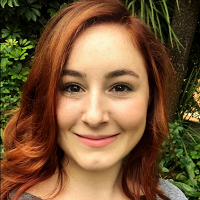
Growing up, I never thought I’d be in therapy at the age of 19.
It wasn’t that I carried any major taboos around therapy, but I’d always had the impression that it was somehow only for people with major issues or trauma. Having been exposed to Zen Buddhism, I had also clung to the idea that it’s our job to find peace within our situation—regardless of how chaotic and awful it may be.
But what happens when we can’t find or keep that peace? What happens when, frankly, we lose our sh*t?
As a highly sensitive person, I have often struggled to keep my balance. For as long as I can remember, I’ve been dealing with the depth of my own sensitivity, as well as acting like a sponge for everyone else’s emotions and anxieties. Although challenging, this was never a major problem until I went to university and left the safe bubble of my hometown.
It was at the end of my first year, during the #FeesMustFall protests at my university in South Africa, that I first realized I wasn’t coping. As the protests escalated, I was slowly being crushed by the force of my loneliness and upset about the destruction going on—by students, to students, and between them.
Also, despite living a fair distance from the campus, I felt like I was literally taking on each person’s anxiety, anger, and frustration toward the situation. It didn’t matter that I was meditating, eating healthy, and distracting myself with studying for my upcoming exams. My whole body had plugged into that matrix of feeling and was in complete “freak out” mode.
It was my mother who eventually said to me:
“Honey, there’s just this despair underneath everything you’re saying. I think you need to get some help.”
I remember taking a deep breath and replying, “I think so too.”
Since that phone call, I’ve embraced two years of therapy, which has helped me understand and act on behalf of my high sensitivity. So much of life as it is now has been supported by going to therapy, and so I offer these three lessons from my experience:
1. We Are All Truth-Tellers.
One of my favourite TEDx talks is called “Lessons from the Mental Hospital” by Glennon Doyle Melton. In it she shares her personal realizations from having overcome her struggle with an eating disorder and addiction. Her central point: we are all truth-tellers.
She begins by naming how so many of us feel unsafe to bear our sensitivity out in the world. Our feelings seem to make us too conspicuous, too vulnerable to the harshness of our environment that has often given us real reason to feel invalidated, particularly as children. So what happens is that we wrap our tender hearts within a “superhero cape” that says, “I’m fine—in fact, I’m great.” Our truth may be the total opposite.
My experience is that these superhero capes may work for a short time, but soon enough, our truth will find a way to express itself.
At the end of my first year of university, my truth made itself heard through depression and a horrible, angry case of acne all over my body. I had tried for so long to seem like I was doing alright, but eventually my truth began shouting so loudly that I couldn’t ignore it anymore.
Deciding to go to therapy helped me realize that my feelings were valid. That my truth was worth my attention and my love. I realized that it is safe to let go of our superhero capes and face our truth. Because when we do this we honour that we are inherently enough—sensitivity, raging emotions, and all. We also give other people permission to let down their capes.
I’m not going to lie: it’s a scary process to begin to share the feelings that some part of us felt we didn’t have the right to feel. As I peeled back each superhero cape in therapy, I was often overcome with sadness and rage at how much of my truth I had blocked inside of me. However, as I underwent this process I began to tap into some serious clarity around my boundaries and the things that truly nurture me as a unique being. So may it be for all of us.
2. It is Okay to Need Help.
I sometimes feel that the modern world is obsessed with independence.
Whether it’s because of capitalism or other factors, the image of the high-achieving lone ranger is becoming increasingly prevalent. We see this all the time on Instagram with latte-drinking freelancers posting photos of their day, seemingly tied to no one.
Women in particular seem to resist asking for help as a way to reach the ever-rising bar of being a badass. I call this the Dalai Lama/Beyoncé complex. On the one hand, we want to appear peaceful and collected, and on the other we want to #slay.
The result is that we often try to do everything on our own until we’re so overwhelmed that we either reach out for help or keel over and die. I know this seems a bit melodramatic, but my point is that the impulse toward unhealthy independence is something deeply ingrained in many of us.
Going to therapy was a profoundly humbling experience for me because it helped me to understand that asking for help is a necessary and natural part of life. Even if the rest of my week was taken over by the Dalai Lama/Beyoncé complex, every time I walked into my therapist’s room I was so grateful that I had taken this step to ask for help. It just felt right.
Also, as I began to share with others that I was going to therapy, they would often gasp, “Oh my God, you go to therapy? You seem like you have it all together!”
Their relief was palpable as we each let go of our superhero capes and shared how wonderful it is to reach out for help without shame.
What I’ve realized is that asking for help does not make us broken or wrong.
To my dismay, I’ve heard stories of children who were told by their parents to go to therapy and in that moment felt like they were trying to be “fixed.” Although the suggestion is usually well-meaning, these children can be left with the belief that asking for help means that they are somehow not strong enough. The sad fact is that any adult in our childhoods or even later could have contributed to this kind of belief. If this is true for us, then it is our prerogative now to dismantle and replace these influences with more positive ones.
So for those of us who resist asking for help, I might suggest scheduling one “Help Hour” each week. That hour can include reaching out for actual help or meditating on the help we could ask for in various parts of our lives. Slowly, we’ll begin to train ourselves to have a healthy level of interdependence with people who will help our lives to flow as they are meant to.
3. True Healing Takes its own Damn Time.
Something that took me a long time to learn was that true healing has to penetrate both our intellects and our bodies.
One of the reasons why I’m sometimes cautious about psychologists is because so many of them buy into the notion of the “talking cure.” This is basically the idea that once we can talk out our problems and understand them, then poof—we’re cured! The problem with this is that real healing cannot happen merely in our heads.
I was very blessed to have a therapist who used body inquiry techniques as a way to help me not only understand my experiences, but to actually tap into their energy in my body and release them. However, even with the inclusion of this practice, I often found that an issue I had “understood” months ago would only begin to feel truly at peace after a considerable amount of time.
One of my favourite Rumi quotes is, “This being human is a guesthouse. Every morning a new arrival.”
What I love about this quote is that it helps us to understand that our “guests”—our emotions and experiences—will come and stay for as long they as need to be finished with their business. The only job we have is to welcome them. We may need to welcome them for weeks, and sometimes for years, but only when they feel truly at home will they leave.
Although it may be extremely frustrating at times, I don’t think we need to be afraid or impatient with the process of healing. Because like any artist knows, the real magic is found in the process of slowly discovering the people we are capable of being, regardless of how long it takes to “finish.”
The artist knows that no work of art is ever truly finished, as we are never truly finished.
~
~
Author: Anthea van den Bergh
Image: Author’s own
Editor: Nicole Cameron
Copy Editor: Callie Rushton






Read 5 comments and reply